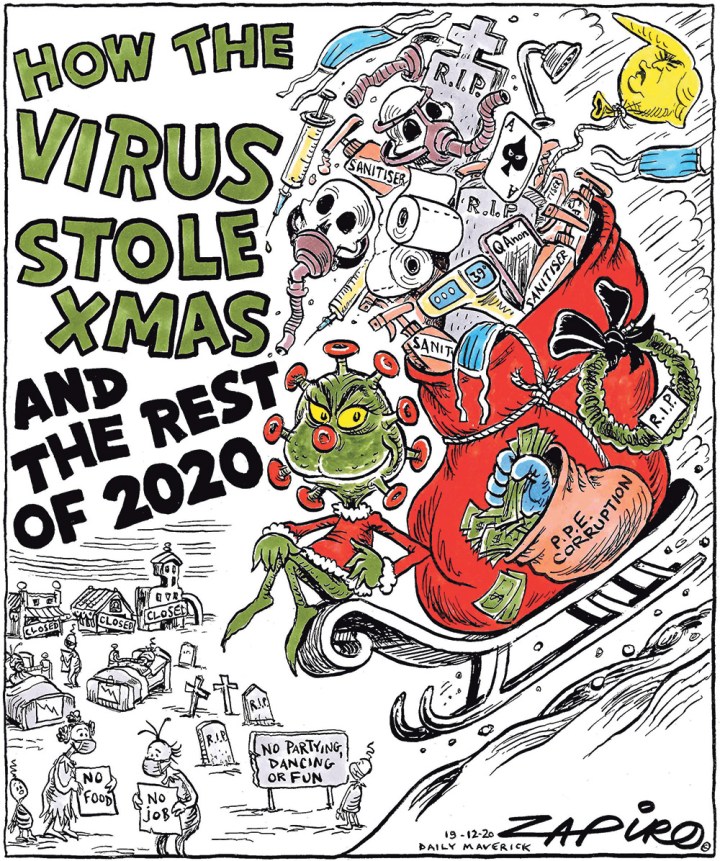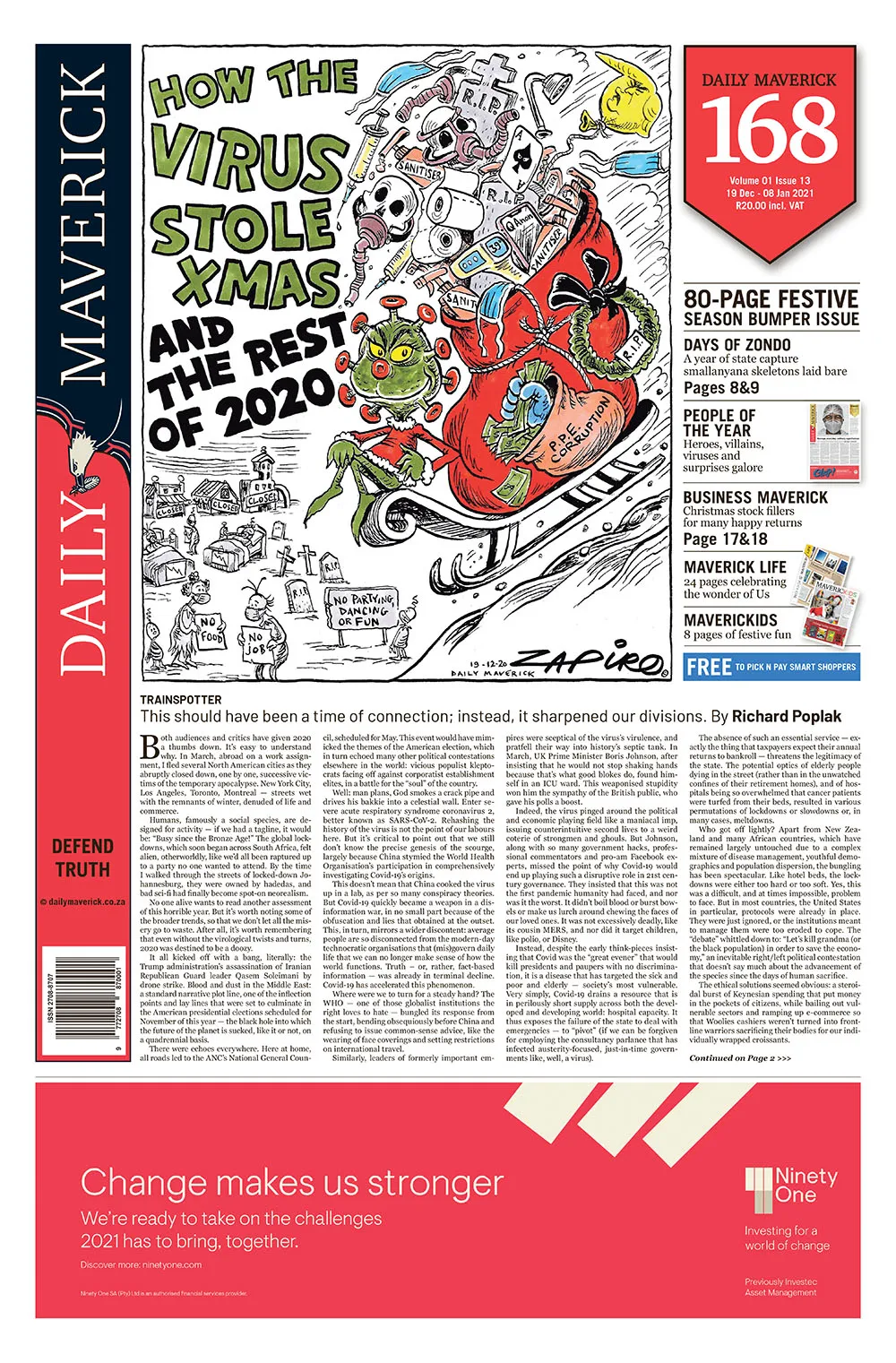Trainspotter 168
How the virus stole Xmas and the rest of 2020

This should have been a time of connection; instead, it sharpened our divisions.
First published by Daily Maverick 168 weekly newspaper
Both audiences and critics have given 2020 a thumbs down. It’s easy to understand why. In March, abroad on a work assignment, I fled several North American cities as they abruptly closed down, one by one, successive victims of the temporary apocalypse. New York City, Los Angeles, Toronto, Montreal — streets wet with the remnants of winter, denuded of life and commerce.
Humans, famously a social species, are designed for activity — if we had a tagline, it would be: “Busy since the Bronze Age!” The global lockdowns, which soon began across South Africa, felt alien, otherworldly, like we’d all been raptured up to a party no one wanted to attend. By the time I walked through the streets of locked-down Johannesburg, they were owned by hadedas, and bad sci-fi had finally become spot-on neorealism.
No one alive wants to read another assessment of this horrible year. But it’s worth noting some of the broader trends, so that we don’t let all the misery go to waste. After all, it’s worth remembering that even without the virological twists and turns, 2020 was destined to be a doozy.
It all kicked off with a bang, literally: the Trump administration’s assassination of Iranian Republican Guard leader Qasem Soleimani by drone strike. Blood and dust in the Middle East: a standard narrative plot line, one of the inflection points and lay lines that were set to culminate in the American presidential elections scheduled for November of this year — the black hole into which the future of the planet is sucked, like it or not, on a quadrennial basis.
There were echoes everywhere. Here at home, all roads led to the ANC’s National General Council, scheduled for May. This event would have mimicked the themes of the American election, which in turn echoed many other political contestations elsewhere in the world: vicious populist kleptocrats facing off against corporatist establishment elites, in a battle for the “soul” of the country.
Well: man plans, God smokes a crack pipe and drives his bakkie into a celestial wall. Enter severe acute respiratory syndrome coronavirus 2, better known as SARS-CoV-2. Rehashing the history of the virus is not the point of our labours here. But it’s critical to point out that we still don’t know the precise genesis of the scourge, largely because China stymied the World Health Organisation’s (WHO’s) participation in comprehensively investigating Covid-19’s origins.
This doesn’t mean that China cooked the virus up in a lab, as per so many conspiracy theories. But Covid-19 quickly became a weapon in a disinformation war, in no small part because of the obfuscation and lies that obtained at the outset. This, in turn, mirrors a wider discontent: average people are so disconnected from the modern-day technocratic organisations that (mis)govern daily life that we can no longer make sense of how the world functions. Truth – or, rather, fact-based information — was already in terminal decline. Covid-19 has accelerated this phenomenon.
Where were we to turn for a steady hand? The WHO — one of those globalist institutions the right loves to hate — bungled its response from the start, bending obsequiously before China and refusing to issue common-sense advice, like the wearing of face coverings and setting restrictions on international travel.
Similarly, leaders of formerly important empires were sceptical of the virus’s virulence, and pratfell their way into history’s septic tank. In March, UK Prime Minister Boris Johnson, after insisting that he would not stop shaking hands because that’s what good blokes do, found himself in an ICU ward. This weaponised stupidity won him the sympathy of the British public, who gave his polls a boost.
Indeed, the virus pinged around the political and economic playing field like a maniacal imp, issuing counterintuitive second lives to a weird coterie of strongmen and ghouls. But Johnson, along with so many government hacks, professional commentators and pro-am Facebook experts, missed the point of why Covid-19 would end up playing such a disruptive role in 21st-century governance. They insisted that this was not the first pandemic humanity had faced, and nor was it the worst. It didn’t boil blood or burst bowels or make us lurch around chewing the faces of our loved ones. It was not excessively deadly, like its cousin MERS, and nor did it target children, like polio, or Disney.
Instead, despite the early think-pieces insisting that Covid was the “great evener” that would kill presidents and paupers with no discrimination, it is a disease that has targeted the sick and poor and elderly — society’s most vulnerable. Very simply, Covid-19 drains a resource that is in perilously short supply across both the developed and developing world: hospital capacity. It thus exposes the failure of the state to deal with emergencies — to “pivot” (if we can be forgiven for employing the consultancy parlance that has infected austerity-focused, just-in-time governments like, well, a virus).
The absence of such an essential service — exactly the thing that taxpayers expect their annual returns to bankroll — threatens the legitimacy of the state. The potential optics of elderly people dying in the street (rather than in the unwatched confines of their retirement homes), and of hospitals being so overwhelmed that cancer patients were turfed from their beds, resulted in various permutations of lockdowns or slowdowns or, in many cases, meltdowns.
Who got off lightly? Apart from New Zealand and many African countries, which have remained largely untouched due to a complex mixture of disease management, youthful demographics and population dispersion, the bungling has been spectacular. Like hotel beds, the lockdowns were either too hard or too soft. Yes, this was a difficult, and at times impossible, problem to face. But in most countries, the United States in particular, protocols were already in place. They were just ignored, or the institutions meant to manage them were too eroded to cope. The “debate” whittled down to: “Let’s kill grandma (or the black population) in order to save the economy,” an inevitable right/left political contestation that doesn’t say much about the advancement of the species since the days of human sacrifice.
In this mess, we have all lost. Staggeringly so. People have lost incomes and career momentum. Much more importantly, people lost people. More than 1.6 million of them. That number, however accurate, doesn’t quite quantify the enormity of the crisis. Death stalked relentlessly, in a way that is not reflected in the death toll.
The ethical solutions seemed obvious: a steroidal burst of Keynesian spending that put money in the pockets of citizens, while bailing out vulnerable sectors and ramping up e-commerce so that Woolies cashiers weren’t turned into frontline warriors sacrificing their bodies for our individually wrapped croissants.
America failed at this spectacularly. South Africa only gestured at it. That said, at least Team Ramaphosa believed the virus existed. With the genocidal HIV/Aids denialism of the Mbeki era very much in mind, the ANC-led government made a big show of nodding sagely whenever the scientists spoke. Not letting a good crisis go to waste, they formed a National Command Council that superseded the traditional democratic decision-making process – a play-play politburo, starring Ramaphosa as a slightly more boring Khrushchev. The country locked down hard. The elite played Xbox in their palaces. The poor starved in their shacks.
Despite the “family meetings” – televised addresses by an exhausted president that defined our collective fates – the lack of communication from this rump government felt arbitrary and cruel. When they did communicate, some of the ordnances from on high were so absurd that they have become South African legend. Let’s put it this way – the National Command Council effectively banned e-commerce for the hardest stretch of the lockdown. Most appallingly – and I include the insane amount of personal protective equipment procurement corruption in this calculus – was the decision to wash hundreds of billions of fake small business stimulus money through the major banks. To date, almost none of that funding has been disbursed. Meanwhile, a disgustingly small top-up was offered to those already subsisting on government grants, guaranteeing that economic hardship would be borne by those already on (or over) the edge.
The establishment, wrong about almost everything, screamed to the heavens about “debt”. But what the South African approach proved – what Covid-19 has shown without a doubt – is that modern economies don’t work for the people. They are inhuman and inhumane. Some sectors suffered, others flourished in a way that felt both capricious and against the spirit of the so-called development state. The failure was not utter, but it was close. South Africa was by no means alone in this, and the most persistent result of the virus will be another endless bout of austerity, cost-cutting and rolling back on the programmes most needed if we are to create more equitable living arrangements — Finance Minister Tito Mboweni’s parsimonious wet dream.
Meanwhile, under the cover of Covid’s darkness, the world marched on, mercilessly so. Huge, generationally transformative stories have been buried or misunderstood. Here’s just one: Under Trump, the remaking and remapping of the Middle East – exemplified by the White House-brokered war deal between Israel and the United Arab Emirates – has resulted in the de facto erasure of Palestine, and fundamentally brought to a close one of the great moral issues of our times. It has not concluded with justice. This is just one example of the fact that both locally and geopolitically, Covid-19 has helped entrench a business-focused technocratic authoritarianism that is entirely self-interested and transactional.
But didn’t the good guys win in the end? Hasn’t the silver lining been the fact that “normal”, rational liberal governance is once again back in vogue? In South Africa, Ramaphosa has his radical transformation enemies on the legal ropes, for now. And when the American elections finally did come around, the Joe Biden-Kamala Harris ticket earned another term for the liberal establishment to show its worth. And yet, these are almost the same people who ceded the floor to Trumpism four years earlier. Trump won 74 million votes in the face of a public health crisis and an economic death spiral – his defeat was not just Pyrrhic, but indicative of the robust health of his drunk-uncle brand of neofascist conman hucksterism.
In this mess, we have all lost. Staggeringly so. People have lost incomes and career momentum. Much more importantly, people lost people. More than 1.6 million of them. That number, however accurate, doesn’t quite quantify the enormity of the crisis. Death stalked relentlessly, in a way that is not reflected in the death toll.
There have been absurd hot-takes on how bad 2020 has been — a Sunday Times editorial described it as the worst for South African children since 1976, which qualifies as the dumbest thing published all year.
But our empty cities reflected a larger emptiness — an absence of leadership, of humanity, of morality in the systems that govern human life. This should have been a time of connection, when we bonded in our shared concerns and vulnerability. Instead, it has sharpened our divisions and inequities. 2020 wasn’t just a bad year, it was a hinge in the 21st century, a door to the future that now swings wildly this way and that. In choosing the way forward, we will define our approach to far larger crises – think: climate – that face us in the future. This year was a warning, a screaming canary down a pitch-dark mine. We should heed it. DM168
This story first appeared in our weekly Daily Maverick 168 newspaper, which is available for free to Pick n Pay Smart Shoppers at these Pick n Pay stores.





















Wow! Poplak is able to write an amusing article on a serious subject without including any gratuitous obscenities. Congratulations!
Mr Poplak, this is the finest resume I’ve read of a year the very Brit Queen herself should have reserved the words annus horribilis. I have forwarded your wordscape around the globe. Like a benign virus. I hope its infection will assist in computing what feels like a Schrodinger puzzle. And perhaps add a few more benefactors. Thank you.
Good to read Poplak again. The canary is screaming that climate change and pandemics go hand in hand. If government nodded their heads sagely in the presence of medical scientists, why aren’t they listening (with rapt attention) to climate scientists? Perhaps they need badges that read: ‘Trust me, I’m a climatologist’.